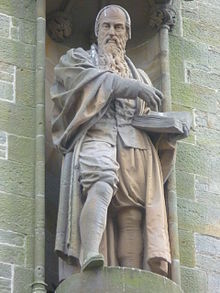Bible Knowledge Graph
John Knox
- Entity ID:
- john-knox
- Long Name:
- Knox, John, 1505-1572
- Short Name:
- John Knox
- Disambiguation String:
- Scottish reformer
- Entity Type:
- person
- Entity Subtype:
- author
-

- Wikipedia
- Summary:
-
Little information has survived about his early life, beyond that he was was probably born in Haddington, about 17 miles outside of Edinburgh and later educated at St Andrews just at the time reformed Christian theology was starting to penetrate the university there.
The exact time of John Knox conversion is not known, however it is clear that by the end of March 1543 he was committed to the Christian gospel. It was at this time that he was persuaded to take a more public stand for the gospel and act as the bodyguard for the preacher George Wishart. who had been accused of conspiring to assassinate Cardinal Beaton, the Roman Catholic emissary to Scotland. Only five hours after Knox eventually left him George Wishart was arrested, tried, convicted, and condemned to death.
Having been Wishart's bodyguard meant that Knox himself was now in danger, after being harried around Scotland for a while he ended up fleeing to St Andrews where a group of gentry and their supporters had killed Cardinal Beaton and taken over his castle. While in St Andrews Knox was officially appointed preacher, and preached his first sermon on Daniel 7:24-25. It soon became apparent that Knox was prepared to strike at the very root of the Catholic system. When The castle of St Andrews finally surrendered to the French backed forces of Mary Stuart in August 1547, Knox was sentenced to serve as an oarsman in the French galleys. While this was a time of great physical suffering it was also a tome of great strengthening spiritually.
After his release from the galleys in 1549 Knox settled in England and became a minister in the Church of England, which was then at the height of its own reformation. It was not long however before differences began to show themselves between Knox and those in the Church of England who only wanted a partial reformation of the Roman Catholic system.
When in 1553 King Edward VI died and was succeeded by his sister Mary who was an ardent Catholic, Knox felt it was time to leave England for continental Europe. It was not long after this that he was appointed Pastor of an English speaking church in Frankfurt, this did not last long though as the church became dominated by those who insisted upon an Anglican form of worship rather than one with gospel preaching at its center. Knox moved on to Geneva where he began to Pastor the first true Puritan church, a church which held preaching to be the center of church worship.
After the death of Queen Mary of England the Geneva church decided to transfer home to England, this allowed Knox to return to his home country of Scotland in 1559. Things were not straightforward for Knox even then. In Scotland Mary of Guise was ruling as Queen of France and Scotland. Knox preached around Scotland gaining support for the reformation, while Mary used French troops in an attempt to gain a decisive military victory over the Protestants. Her victory was not to be, While Mary looked for support from France, The Protestants had secured support from Elizabeth in England.
In July 1560 Mary of Guise died and by August 1560 Scotland was declared Protestant by an act of Parliament, a National Reformed church was established and John Knox was active in organizing it. While all of this was going on Mary Queen of Scots was living in France with her husband. In December he died, and Mary was allowed to return to Scotland on the condition that she did not attempt to bring back the blasphemous Catholic mass to Scotland. Mary did not keep to this agreement and was soon using every available subterfuge to promote Catholic influence throughout Scotland.
In the event it was not the mass that brought about Mary's downfall but her marriage to the Earl of Bothwell, who she married in secret after he had murdered her husband Lord Darnley.
Mary was forced to abdicate the throne in favor of her young son James. Although Mary made several later attempt to regain the throne her influence was now effectively over. This left Knox for the remainder of his life the time to concentrate on his preaching and pastoring work in St Giles, Edinburgh. He preached for the last time on 9 November 1572 and was taken ill a few days later and he died on 24 November 1572.
- Viaf ID:
- 100199622
- DB Pedia ID:
- John_Knox
- Biblical Status:
- canonical
- Is An Individual:
- Yes
- Is Published:
- Yes
- Birth Date:
- AD 1505
- Death Date:
- November 24, 1572
- Occupation:
- Scottish reformer
- Works:
History of the Reformation of Religion in Scotland
Works of John Knox, Vol. 1 (of 6)
First Blast of the Trumpet Against the Monstrous Regiment of Women.
